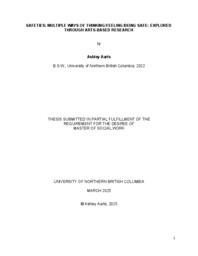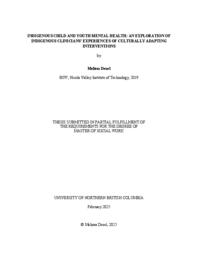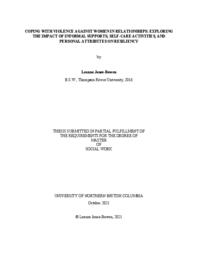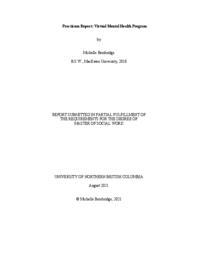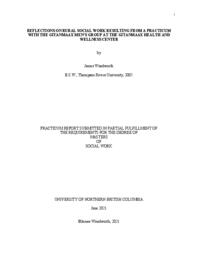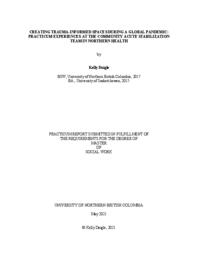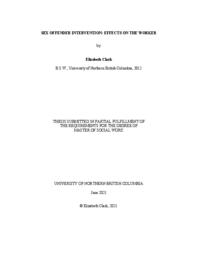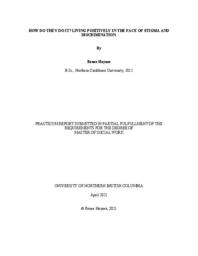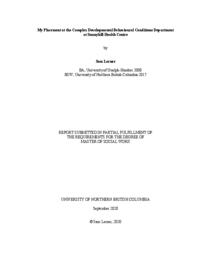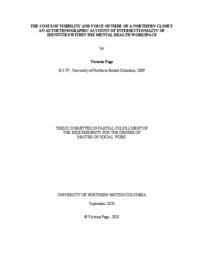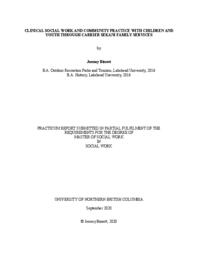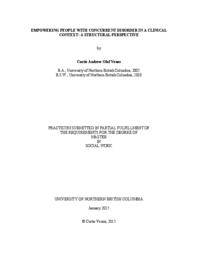University of Northern British Columbia. Social Work
Related Works
Content type
Digital Document
Description / Synopsis
no synopsis available
Origin Information
Content type
Digital Document
Description / Synopsis
During my practicum at Foundry Prince George (September 2024–April 2025), I pursued
three interconnected goals: enhancing leadership skills, co-facilitating dialectical behavioral
therapy (DBT) groups, and developing a brief action therapeutic system (BATS) called
Archetypical. Leadership growth occurred through project development, team support, and
facilitation, using relational and trauma-informed approaches. DBT group facilitation deepened
my understanding of collaborative program delivery and group dynamics. Archetypical—a
BATS combining elements of CBT, DBT, narrative therapy, and tabletop role-playing—showed
potential in fostering emotional insight, agency, and connection, especially among
neurodivergent youth and those with trauma histories. Participant feedback highlighted its
accessibility and impact, though challenges in engagement, perception, and facilitation logistics
emerged. Overall, this practicum strengthened my capacity for creative, collaborative, and
responsive social work practice.
Origin Information
Content type
Digital Document
Description / Synopsis
no synopsis available
Origin Information
Content type
Digital Document
Description / Synopsis
No synopsis available
Origin Information
Content type
Digital Document
Origin Information
Content type
Digital Document
Description / Synopsis
This report outlines my practicum experience as a Child and Youth Mental Health
(CYMH) counselor at Connexus Community Resources from July 2024 to February 2025. I
completed my practicum on the clinical services team at Connexus which allowed me to get a
sense of the different programs and services provided by the agency while focusing on clinical
counseling. The report outlines my learning goals, which include developing skills in different
therapeutic modalities (specifically Cognitive Behavioural Therapy [CBT] and play therapy) and
using these skills to address complex trauma, as well as to learn how to utilize different
counselling skills cross culturally; these goals are all pointed towards my overall goal, which was
to start developing my identity as a clinical social worker in the north. My personal positioning
and theoretical orientation, specifically how my social location shapes my current practice and
how I follow a social constructivist strengths-based approach, are explored. A literature review
highlights five topics that formed the foundation of my learning goals and shaped my practicum:
complex trauma, the therapeutic relationship and play therapy, CBT and Trauma-Focused CBT,
northern practice, and cross-cultural work with Indigenous children and youth. A discussion of
my learning experience highlights the progress I made in completing my learning goals as well
as demonstrates some of the challenges I encountered, such as in learning how to shift my lens
from a child welfare perspective to a clinical perspective.
Origin Information
Content type
Digital Document
Origin Information
Content type
Digital Document
Origin Information
Content type
Digital Document
Origin Information
Content type
Digital Document
Description / Synopsis
This thesis was conducted in the province of Alberta’s Edmonton Metropolitan Region (EMR) to identify the themes and variances among women’s informal methods of coping with and leaving abusive relationships, using a qualitative-exploratory approach. With the acknowledgment of feminist theory, the strengths-based perspective, and person-centred theory, this thesis explored women’s perspectives and their personal experiences of resiliency during and after leaving their abusive, male partners. Thematic analysis was used to code and analyze the data, which identified the following themes among the survivors: strong, informal support networks, engaging in self-care activities and self-improvement activities as a trauma response, and, the shared, personal attributes of self-preservation, resourcefulness, and self-reflection. Recommendations for theory, practice and further research are posed to the helping professions and informal support networks of survivors.
Origin Information
Content type
Digital Document
Description / Synopsis
People who reside in rural areas are faced with ongoing barriers to accessing mental health services. A number of aspects of rural life such as the rural community, social networks, and limited access to service all have particular implications for people experiencing mental health issues. Additional issues such as the effect of rural culture on help-seeking for mental illness, the lack of anonymity in small communities and the difficulty to maintain confidence, and mental health and addictions stigma may further impact the recognition, treatment, and maintenance of mental health problems for people in rural and remote locations. Providing mental health services to residents in these places requires creative and flexible service delivery options. This practicum report details my experience with the Virtual Mental Health Program at Alberta Health Services and highlights the role that social workers play in delivering mental health services in underserved locations as well as the potentials for further developing these services.
Origin Information
Content type
Digital Document
Description / Synopsis
Contextualizing clinical social work practice was the goal of the 450 practicum hours I completed at Walmsley and Validity Counselling Services. The practicum report starts with an overview of clinical social work practice and provides a detailed history of the practicum agency, services offered, and funding. In the following chapters, I explore and weave myself into the theoretical orientations that ground my practicum practice. Also, there is a salient review of literature necessary to contextualize clinical practice, especially in Northern British Columbia. From the practicum experience, I drew connections between the contextualization of clinical social work practice and key elements such as reflexivity, supervision, and training.
Origin Information
Content type
Digital Document
Description / Synopsis
This report focuses on the clinical social work skills and knowledge I gained during my Master of Social Work (MSW) practicum at the Warrior Support Centre in Mental Health Services with the 2 Field Ambulance unit at Garrison Petawawa in Petawawa, Ontario. My theoretical frameworks that guided my learning included General Systems Theory, Ecosystems Perspective, and Feminist Theory. My chosen methodology was discourse analysis to deepen my understanding and learning experiences. Literature on the Canadian Armed Forces (CAF), military social work, mental health, and stigma in the military informed my construction of knowledge and observations. This report outlines my overall learning goals and objectives in clinical social work practice supporting active military members. My experiences, observations, clinical skill development and subsequent practice implications are explored at length.
Origin Information
Content type
Digital Document
Description / Synopsis
The purpose of this report is to summarize my practicum experience with the Gitanmaax Men’s Group at the Gitanmaax Health and Wellness Centre in Gitanmaax Village, BC. The agency serves Gitanmaax membership living within the community of Gitanmaax village as well as those living off-reserve in the surrounding area. This report outlines the learning goals of my practicum and how those objectives were met through reflection, supervision, mentorship, and practice. Unforeseen learning came as a result of the COVID-19 pandemic and the impact it was having on the Gitxsan nation and on the transfer of cultural knowledge to the younger generation. Along with strengthening my social work skills, my practicum allowed me to explore rural ethics in social work and how these connect to practice. This account of what emerged from my practicum learning concludes with suggestions around ethics, self-care, service delivery, and one’s role as a non–First Nations person working in a First Nations community.
Origin Information
Content type
Digital Document
Description / Synopsis
During my social work practice with vulnerable populations, I have found that many clients and families I work with have experienced trauma in various forms. This is no less true in our current reality of concurrent health crisis: the opioid epidemic and the COVID-19 pandemic. My practicum at CAST provided me with numerous opportunities to observe, evaluate and provide trauma-informed practice through direct and indirect learning and training opportunities. My learning goals were to learn clinical practice skills for individual practice, to learn how to provide quality trauma-informed practice, and to develop a professional practice framework consistent with the British Columbia College of Social Workers (BCASW) Code of Ethics. This report discusses my practicum experiences, implications for personal practice such as the need for ongoing, effective self-care, and concludes with several recommendations for social work practice.
Origin Information
Content type
Digital Document
Description / Synopsis
This paper describes a qualitative study involving six participants who work in the field of sex offender intervention. Participants’ struggles and professional rewards are examined. Recommendations on workplace policy and procedure adjustments are made based on the findings. Although participants identified rewards of their work, they described many physical, emotional, and mental health struggles they encountered, because of their employment. They also identified supports that promoted their wellbeing in the work.
Origin Information
Content type
Digital Document
Description / Synopsis
Exploring the experiences of people who build a casket for a loved one is not clearly delineated in academic literature. This study focused on identifying and sharing the experiences of people who engaged in casket building for a loved one. The purpose of the research was to explore and interpret people’s experiences with casket building. Using an interpretive description approach and thematic data analysis, my research encompassed the experiences of four people who engaged in casket building for a loved one. Ultimately, four themes were generated: 1) A Desire for Something Different, 2) Influential Death Rituals, 3) The Importance of Relationships, and 4) Maintaining Wellness. The research supports those who may choose to follow in their footsteps. The study also encourages social workers to utilize practices, which some may consider non-traditional, to best meet the needs of the populations they serve.
Origin Information
Content type
Digital Document
Description / Synopsis
In reviewing the literature it is apparent that HIV diagnosis and treatment has improved greatly over the years. Treatment is now simpler with fewer side effects and the concept of U=U, having an undetectable viral load means the virus is untransmittable, has given many women more confidence to lead healthy and positive lives. Many women are supported by the work of organizations such as Positive Living North which allows them a place to access nonjudgmental peer interactions and acceptance. The purpose of this report is to summarize my practicum experience at the Positive Living North: No khe̅ yoh t'sih'en t'sehena Society (PLN) in Prince George, British Columbia. This report outlines my expectations and goals within my practicum and how my learning objectives were met through observation, discussion, and practice. This experience allowed me to examine and reflect upon inherent biases as well as reimagining my future practice as a social worker.
Origin Information
Content type
Digital Document
Description / Synopsis
Attention-deficit/hyperactivity disorder (ADHD) is a controversial diagnosis that is debated in public and professional spheres. However, the experiences of Aboriginal peoples have largely not been included in this debate. Considering that reactions to trauma may include hyperactivity and attention-deficits, and that mental health is defined differently in different cultures, this is arguably problematic. This research uses a qualitative exploratory approach embedded in an anti-oppressive social work research framework to explore the experiences of four urban Aboriginal mothers of children diagnosed with ADHD in Northern British Columbia. It was found that Aboriginal caregivers experience many challenges already recorded in the literature, and that they also grapple with the impacts of colonialism and intergenerational trauma in different ways. When considering the principles of allyship and anti-oppressive practice, this raises ethical questions about where the burden of responsibility lies, as well as how ADHD is currently defined and used in practice.
Origin Information
Content type
Digital Document
Description / Synopsis
This report chronicles a part-time 14 month field practicum at Canadian Mental Health Association, Regina Branch. The document provides an overview of Asset Based, Empowerment Approach and Change Theory within the Community Engagement program and how they were applied as an intervention to increase access to primary mental health. There is also a discussion about the variety of presentations that I attended and participated in throughout the field practicum. An outline is provided about the professional development opportunities that strengthened my practice. I also reflect on the ethical issues and challenges I faced during my field practicum. Throughout the document I discuss ways in which I was able to achieve my learning goals in the field practicum.
Origin Information
Content type
Digital Document
Description / Synopsis
My practicum at the Sunnyhill Complex Developmental and Behavioural Conditions Department has taught me about the role of Social Work within an interdisciplinary team in a medical setting, and the value of aligning with the needs and strengths of families and caregivers. This practicum has also informed me on the function of a diagnosis in determining community supports. My preparatory research included youth with developmental disabilities, the assessment process, the need for more significant structural support, the life-needs model, the portage model, how to support families and caregivers, social work within an interdisciplinary team, mindfulness and outcome evaluations. My learning experience has implications for my future practice working within interdisciplinary teams. In my future work, I aspire to promote social justice and ethical practice by using my skills and expertise of external and community resources to overcome barriers in culturally sensitivity ways that honours the client’s unique strengths, needs, and their selfdetermination. My experience and learning enriched my professional capacity and my appreciation of the value of Social Work in supporting families and individuals.
Origin Information
Content type
Digital Document
Description / Synopsis
This study is an exploration of the intersectionality of my two identities, lesbian and social worker, within the northern British Columbia (BC) mental health workspace. By taking a transformative stance and making use of queer methodology, I present my voice as both the researcher and the researched. My data sources are based on past recollections and a collection of personal poems, reflections, stories, journal entries, sketches, collages, and photographs. Through autoethnographic accounts, I examine experiences as my identities intersect and become the focus of workplace bullying and harassment within the setting of northern British Columbia (BC) mental health system. I also examine the personal and professional costs of using internal agency and provincially legislated protocols and policies in challenging workplace bullying and harassment behaviour, such as the little-known topic of disenfranchised grief.
Origin Information
Content type
Digital Document
Description / Synopsis
In this report I weave the practical skills and knowledge I gained from my practicum with Carrier Sekani Family Services (CSFS) with theory related to child and youth mental health. I present human ecology as my grounding conceptual framework in my approach to wellness. I explore theoretical foundations for clinical social work, therapeutic modalities, rurality and cultural diversity through a literature review and build on these to support my practice experience. I include sections on youth mental health, Indigenous issues, ally-ship, trauma informed practice, attachment theory, connectedness, tele-mental health and rural social work practice. Services offered through Carrier Sekani’s counselling program that I have practiced include outreach, assessment, treatment planning, safety planning, referral and discharge. I connect practical experiences of working within Carrier culture as a mental health clinician to the literature and explore how I make sense of the shared and created knowledge.
Origin Information
Content type
Digital Document
Origin Information








